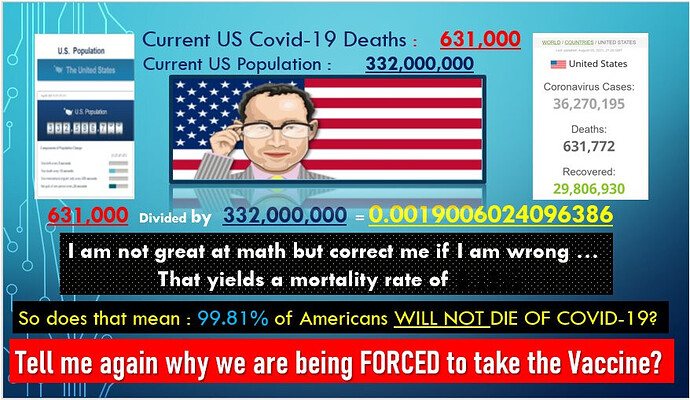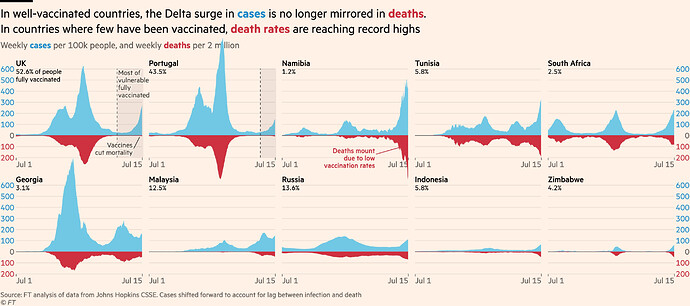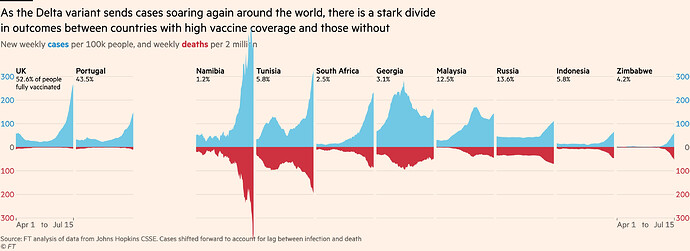Anything but a yes means no
Willing to take a 1 in 500 risk of death to own the libs.
Pro athletes who are anti vax expose themselves as being the biggest dumb asses.
They all put a crap load of unverified things into their body that have not been vetted anywhere close to the vaccine.
It’s pretty amazing the medical staffs on these teams can’t convince them.
Some good news
I just can’t understand why Bill Gates needs to inject more than 2 chips into me?
He’s single now.
It was never the economics, though. It was always the racism.
Because low probability very high risk events, like say death, are worth insuring against. Especially when the only thing you have to do is get a damn shot.
Even based on the numbers in that image it is 1 in 60. obviously there will be some cases not included in the „confirmed cases“, but the way they calculate fatality rate by using the whole population as the denominator makes no sense at all.
Also this drives me crazy and is a soapbox issue of mine:
The question has to be asked: how much did doctors’ lobbying influence the initial shape of the rollout? What clout did they have with senior health officials?
In February, the Australian Medical Association issued a statement headed “GPs, not pharmacists, best placed for vaccine rollout”.
It said AMA president Omar Khorshid had written to Health Minister Greg Hunt to express the AMA’s concerns.
The release went on: "Dr Khorshid told Sky News that the AMA would prefer that the rollout remained part of usual GP interactions.
“We do have significant reservations about the place of vaccination in pharmacy,” [he said].
"In the very, very rare occurrence of a severe reaction like anaphylaxis to a vaccine, it’s something that we really can’t expect a pharmacist to be able to manage[…]
“But the main reason is that we think that vaccination is part of a primarily holistic care package where people have a healthcare home. They know to go and see their local GP for their healthcare needs.”
Aside from supply issues, another reason for the botched rollout is that people were initially told to go to their GP for vaccinations rather than having purpose-built vaccination hubs where there are economies of scale and non-doctor healthcare workers administer the injections. This put GPs under stress and led to problems where some clinics had vaccines and some didn’t, slowing the rollout.
“People with seven year degrees definitely needed to stick needles in people’s arms, say AMA”. It’s fucking insane and a special case of a chronic make-work for doctors problem we have here. If you need a sick certificate for work, you have to see a doctor. If you have the sniffles or a tummy ache or some other trivial problem, you have to see a doctor. These jobs do not require the huge investment in education made in doctors. It’s just leeching money out of the health system.
Vaccination hubs? Don’t they have Krogers or Meijers down there in Australialand?
The mass vaxx site I went to in LA was a model of efficiency - both times. They could scale it up to any size, basically only limited by the size of the parking lot. The nurse was so good I never felt the needle each time. Kinda ridiculous that AUS just couldn’t learn from what worked in the US.
ITS NOT PERSONAL MFer. It literally impacts every single person you come in contact with every single day.
It’s not personal.
There are two reasons big vaccination centres are a better idea. One is that we have vaccine supply issues, at least with Pfizer, and don’t have enough to just scatter them all around the country and hope people use them. The other is that we have an incredibly concentrated population, in terms of having large cities and then giant stretches of nothing in between, so just scattering hubs through the big cities picks up a huge percentage of the population in a way that wouldn’t be possible in the US.
That’s what we’re doing with Pfizer now. I had both my shots in a big exhibition hall in the Adelaide Showgrounds.
Probably the most easily-digestible presentation of data on vaccines making COVID less deadly that I’ve seen:
Zoom in.
I teach a volunteer English class at the local community center in my town.
This week I asked my students (average age around 70) how long they expected Japan would remain in full mask mode, even if most of the country was already vaccinated.
Answers ranged from “a few more years” to “probably forever.”
I asked how they felt about it. The consensus answer was “not thrilled, but we’ll do it if we gotta.”



